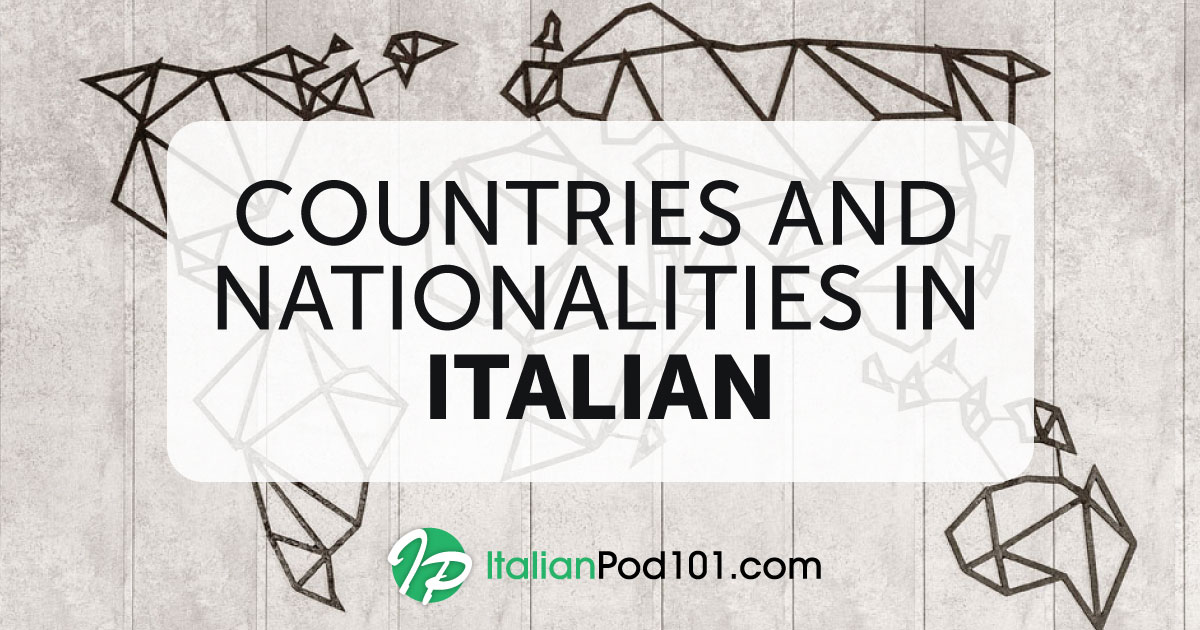
Do you know what the Italian expression Boh! means? Boh! Exactly! That’s the correct answer. 😉 (Don’t worry, we’ll tell you all about Boh! in a minute.)
Every language has words that don’t translate easily to other languages. We’ve all gotten a little crazy trying to translate them or just understand what they mean: They are the dreaded untranslatable words! There are many untranslatable Italian words, and we’ve selected the ten most-used by Italians to share with you. Because, let’s face it, you’re always bound to come across untranslatable words in learning Italian.
But why do we care? Because these untranslatable expressions are exactly what make languages and cultures different and interesting. Very often, these untranslatable words come from deeply rooted cultural traits or from a specific experience in the country’s history. Often, they are impossible to avoid, so learning their meaning and how to use these untranslatable Italian words will help you become more fluent while learning about Italian culture and understanding the Italian mindset.

Of course, since we’re talking about the Italian language and culture, you can expect that many of them are related to family, food, or simply the art of enjoying life.
Let’s start learning the ten most-used Italian untranslatable words! (By the way, Boh! means “I don’t know,” but not just that. We’ll see more details below.) Ready? Let’s dive into the most common untranslatable words in Italian language learning!
Table of Contents
- Ti voglio bene
- Mamma mia!
- Boh!
- Spaghettata
- Pantofolaio
- Abbiocco
- Apericena
- Gattara
- Dolce far niente
- Menefreghista
- Conclusion
Start with a bonus, and download the Must-Know Beginner Vocabulary PDF for FREE! (Logged-In Member Only)
1. Ti voglio bene (tvb)
Ti voglio bene means “I love you,” but it’s a little more complicated than that… Literally, it translates to “I want you well,” and what it really means is a very special kind of love: one that’s usually everlasting, encompassing, and definitely not just a romantic kind of love.
Sure, lovers tell each other ti voglio bene too, but it’s more often an expression that parents, siblings, grandparents, nephews, and longtime couples share. So it’s a greater, deeper kind of love and it’s basically untranslatable in other languages.
Any situation is good to say ti voglio bene, but it’s a treasured word; you won’t hear it in public very often. It’s kept for private, intimate moments. However, you might encounter its acronym TVB used by teenagers in their typical forms of communication: in graffitis around the cities or sent via mobile phones.
Pay attention to its use, because Volersi bene is a reciprocal verb (as “loving one another”) so you always need to put the corresponding personal pronoun. Do you need to learn or revise this? No problem. Here is an easy and fun lesson for you.
You can use it simply like: Mamma, ti voglio bene! Or use one of these variations to give it more emphasis:
- Ti voglio molto bene.
“I love you very much.” - Ti voglio un mondo di bene.
“I love you the world.” - Ti voglio un sacco di bene.
“I love you a lot.”
Note also another difference. While amare, same as “to love,” can have different objects of love (you can love a person, an object, an experience, etc.), ti voglio bene only refers to love between people. This really is one of the most beautiful untranslatable words in Italian.
2. Mamma mia!
Mamma mia! is probably one of the most common and widely used Italian expressions. The literal translation is, of course, “My mother!” but it’s used with the meaning of “Oh my God!” or “My Goodness!” But it really is untranslatable because it’s not only used to express surprise. It’s appropriate in many other situations and for other emotions: fear, awe, disgust…really any occasion is good to yell a mamma mia!
This expression is so typically Italian that it’s often used in other languages to give a quick representation of any Italian.
You pronounce it in isolation. Just saying Mamma mia! conveys all the meaning, relative to the context at hand.
- A: Guarda la mia nuova Ferrari.
B: Mamma mia!A: “Look at my new Ferrari.”
B: “Oh God, that’s beautiful,” or “Oh God, that must have cost a fortune.” - A: Ti piace il mio nuovo taglio di capelli?
B: Mamma mia!A: “Do you like my new haircut?”
B: “Oh God, that’s awful.”
The fact that in English it translates to “Oh God!” goes to show the importance of the mamma for an Italian. The only meaning that Mamma mia! doesn’t have is the one of “my mother,” because in that case you would not invert the noun and the possessive. You would say instead la mia mamma (+caring) or mia madre (+formal).
3. Boh!
Boh! is the most untranslatable Italian word of all. It’s not even a word. It’s just a sound, maybe an onomatopoeia of the brain going into a loop, missing a click!
Boh! means “Who knows?” or “I don’t know,” but it also conveys the hidden messages of “I don’t really care that I don’t know,” and “It’s not that important to me.” All of this with just these three untranslatable letters!
For example, you’re next to me at the train station and you ask me if the train is late. I have no idea, so I reply Boh! and with that I am telling you that:
- I don’t know.
- Maybe nobody knows.
- I’m not really interested in knowing.
- It doesn’t matter anyway.
For example:
- A: Scusa, sai se Il treno è in ritardo?
A: “Do you know if the train is late?” - B: Boh! (See points 1, 2, 3, 4 above.)
Boh! is a sentence of its own. It doesn’t need any more explanation or words to convey its strong meaning of total uncertainty. And after just a few days in Italy, you’ll surely master the specific set of gestures that always go with a Boh!: a raise of the shoulders, the lift of your eyebrow, and the protruding of your lips.
4. Spaghettata
If you’re with a group of Italian friends in Italy or anywhere else in the world, you’re bound to be invited to a spaghettata at some point. But what is it exactly? Is it a dish? Is it a recipe? Is it a party? Is it an event? It’s actually all of this combined!
Literally, a spaghettata is simply a quick dish of spaghetti. But it’s also one of those Italian words that are untranslatable because it has a broader meaning, which includes a late-night get-together with friends to prepare a quick something to eat to end the night out.
Example:
A: Ci facciamo una spaghettata?
A: “What about a spaghettata?”
Note the reciprocal form of the verb fare >> farsi una spaghettata.
Usually, it’s spaghetti aglio e olio (“Spaghetti with garlic sauce”). This is just because it’s what everybody always has in their kitchen, but it could be any kind of pasta and any kind of sauce. Because the only really necessary ingredient for a perfect spaghettata is the company of friends!
5. Pantofolaio
Have you ever had the feeling of just wanting to stay home and relax, wearing comfortable clothes and slippers on your feet, and just do…nothing? Then, on those occasions, you were a pantofolaio.
This Italian untranslatable word literally means “someone wearing slippers” and is the equivalent of a “couch potato,” although it’s not limited to sitting on the couch with the remote. The pantofolaio is also someone who prefers the quiet of the home, doesn’t like the fast life of parties and going out, and would rather have friends over than go out.
Sunday is the perfect day for the pantofolaio. You get up late, have a long breakfast and lunch, and can stay comfortably at home reading, watching TV, surfing the internet, or talking to friends on the phone. You could even watch some foreign shows to help yourself learn!

So if one day you tell your Italian friend that you would rather do a spaghettata at home (see point 4. above) than going out to a Pizzeria with the gang, don’t be surprised if you’re called a pantofolaio:
-
A: Non vuoi uscire? Che pantofolaio!
A: “You don’t want to go out? You’re such a couch potato!”
6. Abbiocco
Abbiocco is one of those untranslatable Italian words that simply doesn’t exist in other languages because it comes from the specific drowsiness that takes hold of you after an Italian lunch. The word comes from the position of a hen hatching its eggs.
You can easily picture the scene: You’re sitting down, comfortable and warm, your eyes slowly begin to shut, and your head starts bobbing forward or sideways…
It could be translated as “food-coma” or just “drowsiness” but the translation doesn’t do it justice at all, as abbiocco is much more gentle. It’s an inviting drowsiness that you just surrender to.
The danger of the abbiocco is definitely always around the corner after the lunch break at work. So, beware of lasagna, polpettone, tiramisù… They are the perfect equation resulting in a colossal abbiocco. And then the only thing to do is to give in to it for at least a half an hour.
- Che abbiocco!
“What a drowsiness!” - Dopo il pranzo mi è venuto l’abbiocco…
“After lunch I got so drowsy…” - Il vino a pranzo mi fa venire l’abbiocco.
“Wine at lunch makes me drowsy.”
Related to the abbiocco, is the habit of taking a short nap, a pennichella or a pisolino, which is a typical Mediterranean (and healthy) habit, especially common during the summer months.
7. Apericena
This word is the combination of Aperitivo, a late afternoon drink and light snacks, and cena, the Italian word for “dinner.” The result is the untranslatable Apericena which you can consider to be a very sumptuous aperitif with a variety of snacks and little dishes, or a light dinner that you eat standing up.
The Apericena fashion (as many other trends) originated in Milan in the 90s. Young people started to meet regularly after work for a quick drink and a little bite to eat. Very soon it became so popular that bars started offering real buffets and lots of different foods to attract clients. The food was so delicious and abundant that the Aperitif ended up substituting dinner. Or rather it became a dinner—or an apericena, in fact.
Now it’s very popular in all the big Italian cities. So, next time you’re in Italy, if around six or seven o’clock in the afternoon on a Thursday or Friday you’re invited to an apericena, you can gladly accept because you already know the meaning of this untranslatable Italian word!

Friends, a drink, and delicious food. That’s an apericena!
- Vieni stasera all’apericena?
“Do you come to the apericena?” - Ci vediamo all’apericena.
“Let’s meet at the apericena.” - Facciamo un’apericena prima del cinema.
“We do an apericena before going to the movies.”
8. Gattara
Everybody loves cats. Just notice how many cute cat videos go around on the internet. But the gattare love them the most! A gattara is literally a “cat lady” and she is a kind of superhero, although she definitely doesn’t wear a black vinyl suit!
Gattara is an untranslatable word in Italian that defines the (old) lady that takes care of cats.
We all know at least one: It’s that woman who loves cats so much that she takes care of lots of them at home, or the one that we see in every big city bringing food to all the stray cats in the neighborhood.
The term originated in Rome, a city with a lifelong love for cats, from the Imperial times to today. One of the places where you’ll find many gatti (“cats”) and gattare is the archaeological area in Largo Argentina, the ideal place for cats who want to find refuge from the chaos of the city, and a mythical place full of history where the stabbing of Caesar occurred.
- Ha 12 gatti. È una gattara!
“She has 12 cats! She’s a gattara!” - La gattara porta da mangiare ai gatti del quartiere.
“The gattara brings food to all the cats of the neighborhood.”
9. Dolce far niente
Dolce far niente… (“Sweet doing nothing…”) The literal translation already says it all. It’s a feeling that combines leisure, idleness, and laziness all at once.
To understand the meaning of this untranslatable expression, just imagine yourself on a sweet spring afternoon; you’re sitting outside, and you just enjoy being there, doing nothing. That can be so sweet!
The expression Dolce far niente is commonly used alone, often in combination with a sigh or a stretching of the limbs. Ah… dolce far niente!
The concept was first encountered in a letter written in a Roman villa around the year 100 A.C. A girl wrote to a friend (in Latin) remembering… illud iucundum nihil agere, translated in Italian as quel dolce far niente, “that sweet doing nothing.” And for the next two-thousand years, Italians have continued mastering that sweet art!
10. Menefreghista
The last word on our list of the ten most untranslatable Italian words and expressions in Italian is menefreghista.
Literally, it means “someone that doesn’t care.” The original expression derives from a sentence issued by a famous poet around the WWI years. His Me ne frego (“I don’t care”) was referred to soldierly courage, and to not care about dying in battle.
The expression continued to be popularly used among Italians, but the meaning of menefreghista (“someone that doesn’t care”) shifted to describe somebody who couldn’t care less, usually about the community, social or political themes, or anything that others consider important.
- Non vota mai, è un menefreghista!
“He never votes, he’s a menefreghista!” - Non viene alle riunioni, che menefreghista!
“She doesn’t come to meetings, what a menefreghista!”
11. Conclusion
Are you ready to dive into the deepest mysteries of the Italian language now? Did you grasp the basics of these Italian untranslatable words?
We truly hope this list of 10 untranslatable Italian words proved helpful to you. Now go out and practice these untranslatable words in Italian. You’ll be a pro in no time!
In the meantime, ItalianPod101.com can help you with those and much more to fully understand all the nuances of the beautiful Italian language.
Start with a bonus, and download the Must-Know Beginner Vocabulary PDF for FREE! (Logged-In Member Only)













